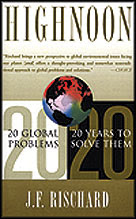Continuing on re Rischard and his book High Noon.... (see previous posting)
The 20 most pressing problems, according to Rischard:
Sharing our planet: Issues involving the global commons
1. Global warming
2. Biodiversity and ecosystem losses
3. Fisheries depletion
4. Deforestation
5. Water deficits
6. Maritime safety and pollution
Sharing our humanity: Issues requiring a global commitment
7. Massive step-up in the fight against poverty
8. Peacekeeping, conflict prevention, combating terrorism
9. Education for all
10. Global infectious diseases
11. Digital Divide
12. Natural disaster prevention and mitigation
Sharing our rulebook: Issues needing a global regulatory approach
13. Reinventing taxation for the 21st century
14. Biotechnology rules
15. Global financial architecture
16. Illegal drugs
17. Trade, investment, and competition rules
18. Intellectual property rights
19. E-commerce rules
20. International labor and migration rules
Rischard stresses that these problems require long-term thinking and commitment, something democracies cannot easily deliver (due to electoral pressures). Nation-states, territorial by definition, are also inadequate, given the inherently global nature of the problems. He proposes the establishment of Global Issues Networks, consisting of experts from various countries appointed by world leaders. These experts will work to extract rough consensus for norms and standards for all countries to adhere to in the interest of the whole world.
Rischard said you'd have to tell these experts that they were working for humanity with an eye to each of them winning a Nobel prize for their work. (I love that idea of appealing to their pride!)
The other thing we'd have to do, he said, is to work towards developing the mindset of global citizenship -- which is where education steps in.
There are several educational projects, based on Rischard's book and his advocacy, now in place, with more likely.
In the US, the NAIS (National Association of Independent Schools) has a program called Challenge 20/20, which pairs schools in the US with a school elsewhere in the world to work on creative global problem solving.
In Europe there are GIN (Global Issues Network) groups starting up in international schools. Clayton Lewis, head of the International School of Luxembourg, has been working with Rischard and a GIN conference is planned for next year.
Here in Asia WAB (Western Academy of Beijing) has a program in place called GIG (Global Issues Group) and they are planning to host a (student?) conference in March 2008.
Rischard said he is also meeting with the IBO to discuss how his framework could be spread throughout their school network.
It's all exciting stuff. Our school already has a well-developed Global Concerns program, but I can see the benefit of becoming part of the Global Issues Network.
Technorati Tags: EARCOS07, global issues, international schools
The 20 most pressing problems, according to Rischard:
Sharing our planet: Issues involving the global commons

1. Global warming
2. Biodiversity and ecosystem losses
3. Fisheries depletion
4. Deforestation
5. Water deficits
6. Maritime safety and pollution
Sharing our humanity: Issues requiring a global commitment

7. Massive step-up in the fight against poverty
8. Peacekeeping, conflict prevention, combating terrorism
9. Education for all
10. Global infectious diseases
11. Digital Divide
12. Natural disaster prevention and mitigation
Sharing our rulebook: Issues needing a global regulatory approach
13. Reinventing taxation for the 21st century
14. Biotechnology rules
15. Global financial architecture
16. Illegal drugs
17. Trade, investment, and competition rules
18. Intellectual property rights
19. E-commerce rules
20. International labor and migration rules
[both images, above right, taken from www.nais.org]
Rischard stresses that these problems require long-term thinking and commitment, something democracies cannot easily deliver (due to electoral pressures). Nation-states, territorial by definition, are also inadequate, given the inherently global nature of the problems. He proposes the establishment of Global Issues Networks, consisting of experts from various countries appointed by world leaders. These experts will work to extract rough consensus for norms and standards for all countries to adhere to in the interest of the whole world.
Rischard said you'd have to tell these experts that they were working for humanity with an eye to each of them winning a Nobel prize for their work. (I love that idea of appealing to their pride!)
The other thing we'd have to do, he said, is to work towards developing the mindset of global citizenship -- which is where education steps in.
There are several educational projects, based on Rischard's book and his advocacy, now in place, with more likely.
In the US, the NAIS (National Association of Independent Schools) has a program called Challenge 20/20, which pairs schools in the US with a school elsewhere in the world to work on creative global problem solving.
In Europe there are GIN (Global Issues Network) groups starting up in international schools. Clayton Lewis, head of the International School of Luxembourg, has been working with Rischard and a GIN conference is planned for next year.
Here in Asia WAB (Western Academy of Beijing) has a program in place called GIG (Global Issues Group) and they are planning to host a (student?) conference in March 2008.
Rischard said he is also meeting with the IBO to discuss how his framework could be spread throughout their school network.
It's all exciting stuff. Our school already has a well-developed Global Concerns program, but I can see the benefit of becoming part of the Global Issues Network.
Technorati Tags: EARCOS07, global issues, international schools